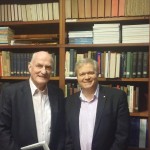Australia's Place in the Future World of Science
Nobel Laureate Professor Brian Schmidt AC engaged a lively crowd at Glover Cottages on Tuesday 2 June. He ranged freely within the parameters of his title, Australia’s Place in the Future World of Science. The story of the stars, he said, goes back to the beginning of human history. Ptolemy had the earth at the centre of the universe. But Galileo, who proved Copernicus correct in asserting that the sun, not the earth, was the centre of the solar system, established the practice of theory, observation and review. Newton took the empirical method further, leading to the science that permeates every aspect of modern life, but which we take for granted. If we continue to do so, we’ll slip back to the dark ages. Australians are good at inventing things, including WIFI, but not at turning them into commercial advantage. We’re not good at investment: no one would be putting nine percent of their income into superannuation if it wasn’t compulsory. Although we don’t have a Cambridge or Harvard, our universities are pretty good. But there’s a poor culture of academics working with industry, and few of them have any business experience. Our economy lacks economic complexity. There’s little investment capital around to grow business, and successful Australian companies inevitably move to the United States and other countries where there is both investment capital and a culture of expansion. The pity is that Australian scientists have high standards, play a constructive part in the international scientific community, but seem not to know how to trade their services around the world.
Brian then addressed global warming. Green house gases were heating things up, and it was very risky to do nothing. But the current Australian government and opposition seemed to be unable to act. Australia seems stuck on fossil fuels and unable to grow or exploit its huge natural advantage in renewables. The countries of South East Asia will rapidly increase their demand for energy, but we seem incapable of planning to exploit the market with renewable energy. As a citizen rather than as a scientist, Brian wondered why we all seemed to be so scared of energy innovation.
During question time, Brian, disappointingly, declined to confirm the existence of worm holes in space, a central tenet in the recently acclaimed film Interstellar.
Report prepared by Richard Broinowski
